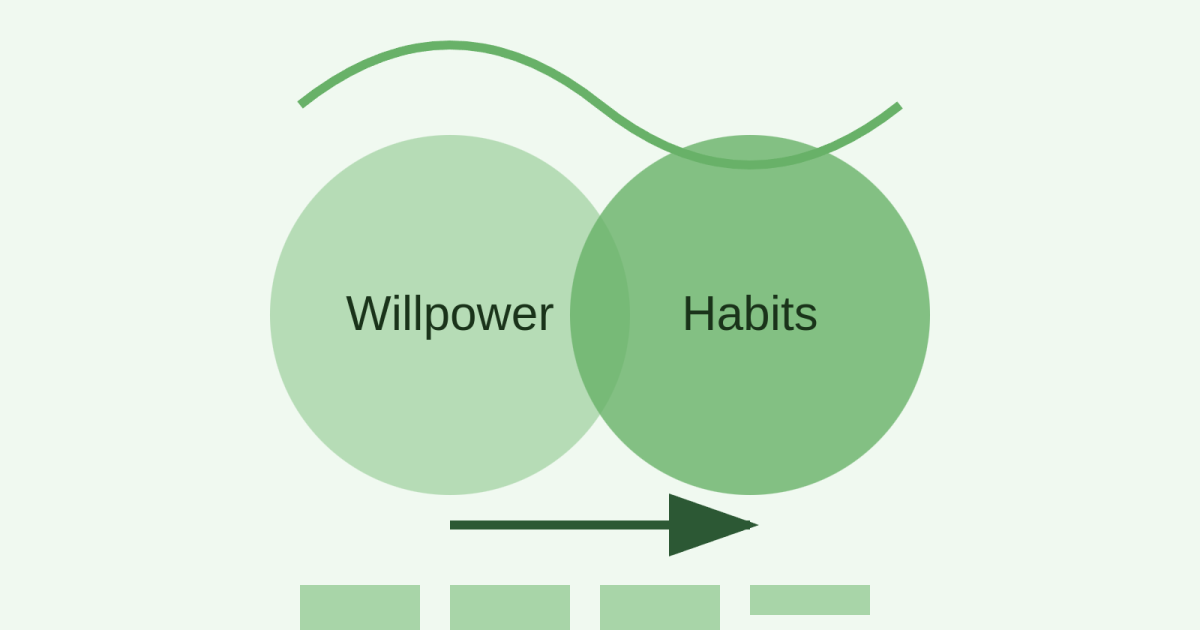Habits Weaken Willpower
Habits weaken willpower. They eliminate willpower.
You make an intention to do something, but you are unable to do it. You intend to be organized, but this organization cannot be maintained. You have habits, you intend that you will not be disorganized now, but it happens from you. We intend not to be lazy, but it happens. Many times you intend that now with commitment, I have to worship. You might have made this intention many times, but then you cannot even continue for two days.
Because willpower is weak, habits are strong. The work that willpower should have done, habits are making us do it.
The Kargah Training System: Regaining Control
The training system of Kargah (workshop), or the training system of a human being, in it, we have to weaken habits, to eliminate them, and to give the control of habits to willpower. This is the essence in a human's life. If this revolution comes, if you have learned this in Kargah, this action that we have to get rid of habits, and therefore, with willpower, we act according to our will. Our willpowers are very ideal, and our habits are very bad.
Now this is a conflict inside you, between habit and willpower.
The Formation and Strength of Habits
Habits are formed in routine life, in everyday life. For example, when you were at home, when you were young, habits started forming from there. Then, as you grew older, habits became stronger. Today, at the age and stage you are at, you have such strong habits within you.
The Habit of Unnecessary Lying: An Example
For example, many people have developed a habit of lying. There is no need, they just lie. For example, often you might have seen these mobile phone users, if you ask them on the mobile, "Where are you?" They are in the market, but they say, "I am at home." Or for example, they are at home and say, "I am in the office." They lie. Just tell where you are, tell that you are here. But they lie unnecessarily. This lying that is done without need, lying should not be done even at times of need. Why not? Because here need has arisen, I have to save my life or gain benefit, they lie. One is lying without need. Most people lie without need. Meaning, they have no need to lie. Habits are making us do things, like lying. I gave an example of unnecessary lying. People unnecessarily lie. Actually, there is no need for this lie, nor is there any benefit from lying, nor do we have to save ourselves from any harm by lying. But they lie anyway. Like I said, a person is standing, someone asks, "What are you doing?" and he says, "Sitting." Sitting is a lie, you are standing. If he is sitting, he says, "I am standing." Or if he is doing some other work, he says, "Reading," while he is playing on the mobile. Ask him, "What are you doing?" he says, "Studying." So, this is a lie. This is a habit of lying. If a person lies intentionally, that is less. In this lie, usually, it comes due to habit. According to habit, he lies. He keeps lying all day long, and at night, he also sees dreams of lies. Correct dreams also do not come to such a person.
Strengthening Willpower: The First Task
Now, the first task that we have to do is to get rid of habits and strengthen willpower. Because Allah has given willpower to humans. If you have to study, you need willpower. If you have to worship, you need willpower. If you have to take a step in the way of Allah, you need willpower. Whatever goal you have, whether of religion or the world, if you have to become a rich person, you heard some of you that this will be the target, that "I will become a very rich person, a wealthy, affluent person," then habits cannot make anyone wealthy, you will have to make an intention.
Willpower and Success: Examples
All these successful people today in the world, wealthy people, who have set up factories, big businessmen, who have billions of rupees and dollars of money, they were once penniless, absolutely broke and destitute. They had nothing. And they also had companions. For example, suppose you might have examples in your area, there must be some rich person. And the companions, relatives, cousins of that rich person might also be there. They are still there, companions, and this person progressed and reached very far. What is the difference? That those who remained useless, they kept living life under habits. Habits, as much work as they are used to doing, they do that much work. They are not used to doing more work, so they simply do not do it. But whoever makes an intention that "I have to earn more money," then he walks under willpower, not under habit.
I remember, I had gone to a country outside my own country for preaching. So, I was staying at a believer's house. He was a strange person. He would sleep at twelve o'clock at night, and at night itself, at two o'clock, he would wake up. And waking up at two o'clock, he would go straight to the vegetable market. There he would buy goods. He would buy goods, and then when the sun rose, around seven or eight o'clock, then he would start selling those goods. He would come back at night, at seven or eight o'clock, he would come back, eat food, and then put me in the car and take me for Majlis (gathering) to the mosque. And he would walk along. Then I would have Majlis with him, it would get late, eleven-twelve o'clock, we would return. Whoever talked about him, they would say, "He is very wealthy, the most money is with him." So, I said, "Have you ever considered why he has money? How much hard work he does, and how strong willpower a person needs to wake up in the morning." Now, to wake up for prayer, for Tahajjud (night prayer), you also have to wake up at two or three o'clock. And to wake up for the market, you also have to wake up at two or three o'clock. Now, those who have intended to earn the world, they need willpower. Those who have intended to walk in the way of Allah, they also need willpower. They spend their lives, so what is the reason that 99% of people are habit-addicted? They are prisoners of habits. Habits have not allowed them to go forward. They lived life under habits.
Even now, there might be elders in your homes, grandfathers, grandmothers, parents. They are just like their parents were. If their parents had five rupees, they also have five rupees. They could not make it fifteen rupees, your grandfather, because they kept living life under habits. But in between, one person emerges from the same family. He comes out of these habits, household habits, family habits, personal habits. He starts studying further, works hard in studies, goes ahead in some practical field. This is a worldly example I am giving. Similarly, if we have to reach a high scholarly level, we also have to come out of habits and strengthen willpower. We can do many works, but we are unable to do them. What is the big reason? Willpower is weak. We give time, but we cannot get results despite giving time. Because along with time, strong willpower is also needed. Willpower keeps a person standing, keeps him firm in the way of Allah.
Five Pillars of Willpower
Here you might have seen a few sentences written: Jidd, Jehd, Nazm, Azm, Jazm. You should know their meanings. Jidd, its relation is also with willpower. Jehd, its relation is also with willpower. Azm, its relation is also with willpower. Nazm, its relation is also with willpower. Jazm is also willpower. This is a combination of how many? Five pillars? How many are there? Five. Jidd, Jehd, Nazm, Azm, Jazm. Five.
Speaker: Syed Jawad Naqvi
Part2 Coming Soon
Urdu Version (Original)
عادتیں ارادے کو کمزور کر دیتی ہیں ارادے کو ختم کر دیتی ہیں آپ ارادہ کسی کام کا کرتے ہیں لیکن وہ کام ہم سے ہو نہیں پاتا آپ ارادہ کرتے ہیں منظم ہونے کا لیکن یہ نظم قائم نہیں رکھا جا سکتا آپ عادتیں آپ ارادہ کرتے ہیں کہ میں نے ابھی کوئی بنظمی نہیں کرنی لیکن وہ ہو جاتی ہے ہم سے ہم نے سستی نہیں کرنی لیکن ہو جاتی ہے کئی دفعہ آپ ارادہ کرتے ہیں کہ اب پابندی کے ساتھ میں نے عبادت کرنی ہے یہ کئی دفعہ ارادہ کیا ہوگا لیکن پھر دو دن بھی جاری نہیں رکھ سکتے آپ چونکہ ارادے کمزور ہیں عادتیں مضبوط ہیں جو کام ارادوں کو کرنا چاہیے تھا وہ عادتیں کروارہا ہیں ہم سے کارگاہ کا تربیتی نظام یا انسان کا جو تربیتی نظام ہے اس میں عادتوں کو ہم نے کمزور کرنا ہے ختم کرنا ہے اور عادتوں کا کنٹرول ارادے کو دینا ہے یہ اصل انسان کی زندگی میں اگر یہ انقلاب آ جائے کارگاہ میں اگر آپ نے یہ سیکھ لیا ہے یہ عمل کہ ہم نے عادتوں سے جان چھڑانی ہے اور اس لئے ارادہ ہوتے ہوئے ہم اپنے ارادوں کے مطابق عمل ہمارے ارادے بہت آئیڈیل ہیں اور ہماری عادتیں بہت خراب ہیں اب یہ ایک کشمکہ شہر آپ کے اندر عادت اور ارادے کی عادتیں معمول کی زندگی میں روز مرہ زندگی میں بنتی ہیں مثلا آپ گھر میں تھے چھوٹے تھے وہیں سے عادتیں بننا شروع ہو گئیں پھر جوں جوں بڑے ہوتے گئے عادتیں پختہ ہوتی گئیں آج آپ جس عمر کے جس عیسے میں ہیں اتنی ہی پختہ عادتیں ہیں آپ کے اندر مثلا کئی لوگ ہیں جن کو عادت پڑ گئی ہے جھوٹ بولنے کی ضرورت نہیں ہوتی ویسے ہی جھوٹ بولتے مثلا اکثر آپ نے یہ موبائل والوں کو دیکھا ہوگا کہ موبائل پہ ان سے پوچھیں کہ کہاں ہو وہ مارکیٹ میں ہوتا ہے لیکن کہتے میں گھر میں ہوں یا مثلا گھر میں ہوتا ہے اور کہتے آفس میں ہوں جھوٹ بولتا ہے بتا دو جہاں ہو وہاں بتا دو آپ کہ میں یہاں پر ہوں لیکن غیر ضروری جھوٹ بولتا ہے یہ جھوٹ جو ضرورت کے بغیر بولا جاتا ہے جھوٹ ضرورت کے وقت بھی نہ بولیں کیوں نہیں یہ کہ یہاں ضرورت پڑھ گئی ہے میں نے اپنی جان بچانی ہے یا فائدہ حاصل کرنا ہے جھوٹ بولتے ہیں ایک ہوتا ہے بغیر ضرورت کے جھوٹ بولنا زیادہ تر لوگ بغیر ضرورت کے جھوٹ بولتے ہیں یعنی انہیں کوئی جھوٹ کی ضرورت نہیں ہوتی عادتیں جو ہم سے کام کرواتی ہیں جیسے جھوٹ بولنا ایک مثال دی میں نے کہ غیر ضروری جھوٹ بولتے ہیں لوگ اصلا اس جھوٹ کی ضرورت نہیں ہے نہ کوئی فائدہ ہونا ہے جھوٹ بولنے سے اور نہ کسی نقصان سے ہمیں جھوٹ بچانا ہے لیکن ویسے جھوٹ بولتے ہیں جیسے میں نے کہا کہ کھڑا ہوا ہے انسان پوچھتا ہے کیا کر رہے ہو تو کہتا بیٹھا بیٹھا ہوا جھوٹ ہے یہ کھڑے ہوئے ہو تم اگر بیٹھا ہوا تو کہتا ہے میں کھڑا ہوا ہوں یا کوئی اور کام کر رہا ہے تو کہتا پڑھ رہا ہوں جبکہ موبائل سے کھیل رہا ہے پوچھو کیا کہتا ہے پڑھائی کر رہا ہوں تو جھوٹ ہے یہ عادت ہے جھوٹ بولنی کی ارادہ کر کے انسان جھوٹ بولے وہ کم ہے اس جھوٹ میں ویسے کم ہی آ جاتی ہے عادت کے مطابق جھوٹ بولے سارا دن جھوٹ بولتا رہتا ہے اور رات کو خواب بھی جھوٹ کی دیکھتا ہے صحیح خواب بھی نہیں آتی انسان کو اب پہلا کام جو ہم نے کرنا ہے وہ عادتوں سے نجات حاصل کرنی ہے اور ارادوں کو مضبوط کرنا ہے چونکہ اللہ نے انسان کو ارادہ دیا ہے آپ نے پڑھائی کرنی ہے تو ارادہ چاہیے آپ نے اگر عبادت کرنی ہے ارادہ چاہیے آپ نے اللہ کی راہ میں قدم اٹھانا ہے تو ارادہ چاہیے جو بھی مقصد آپ نے دین کا دنیا کا اگر آپ نے امیر انسان بننا ہے سنا آپ میں سے باز کہ یہ ٹارگٹ ہوگا کہ میں بہت امیر انسان بن سروت مند دولت مند انسان بن تو عادتیں کسی کو دولت مند نہیں بنا سکتی ارادہ کرنا پڑے گا یہ جتنے آج کامیاب لوگ ہیں دنیا میں پیسے والے لوگ ہیں جنہوں نے فیکٹریاں لگائی ہوئی ہیں بڑے بڑے تاجر ہیں جن کے پاس بلین روپے اور ڈالرز پیسہ ہے یہ کسی دن اماری تا رہی تھے بلکل ویلے اور کنگلے کچھ بھی نہیں تھا ان کے پاس اور ان کے ساتھی بھی تھے مثلا فرض کرو کہ آپ کے ہاں یہ مثالیں ہوں گی ہر علاقے میں کوئی نہ کوئی بڑا امیر آدمی ہوگا اور اس امیر آدمی کے ساتھی رشتدار کزنز بھی ہوں گے وہ ادھر ہی ہیں ساتھی اور یہ ترقی کر کے بہت آگے پہنچ گیا فرق کیا ہے کہ وہ جو نکمے رہ گئے ہیں وہ عادتوں کے تحت زندگی گزارتے رہے ہیں عادتیں جتنے کام کرنی کی عادت ہے اتنا کام کرتے ہیں اس سے زیادہ کام کرنی کی عادت ہی نہیں ہے اس وجہ سے کرتے ہی نہیں ہیں لیکن جو ارادہ کر لیتا ہے کہ میں نے زیادہ پیسہ کمانا ہے تو پھر وہ ارادے کے تحت چلتا ہے عادت کے تحت نہیں چلتا میں یاد ہے مجھے ملک سے باہر ملک میں گیا تھا تبلیغ کے لیے تو ایک مومن کے گھر میں ٹھہرا ہوا تھا تو وہ عجیب انسان تھا وہ صبح رات کو بارہ بجے سوتا تھا رات کو رات کو ہی دو بجے اٹھ جاتا تھا اور دو بجے اٹھ کے وہ سیدھا سبزی منڈی جاتا تھا وہاں خریدتا تھا سامان خریدتا تھا سامان خرید کے پھر جب سورج نکلتا تھا سات آٹھ بجتے تھے پھر اس سامان کو بیچنا شروع وہ رات کو آتا تھا واپس سات آٹھ بجے واپس آتا تھا کھانا کھا کے پھر مجھے گاڑی پہ بٹھا کے لے جاتا تھا مجلس کے لئے مسجد میں اور سات چلتا تھا پھر میں اس کے سات مجلس ہوتی تھی لیٹ ہو جاتا تھا گیارہ بارہ بجے ہم واپس جو لوگ بھی اس کے بارے میں بات کرتے تھے وہ بہت پیسے والا ہے سب سے زیادہ پیسہ اس کے پاس ہے تو میں نے کہا کہ کبھی غور کیا ہے اس کے پاس کیوں پیسہ ہے کتنی محنت کرتا ہے اور کتنا قوی ارادہ چاہیے انسان کو صبح اٹھنے کے لئے اب نماز کے لئے اٹھنا ہے تحجد کے لئے تو بھی آپ دو تین وجہ اٹھنا ہے اور منڈی کے لئے اٹھنا ہے تو بھی دو تین وجہ اٹھنا پڑے گا اب جنہوں نے دنیا کمانے کا ارادہ کیا ہے تو ارادہ چاہیے جنہوں نے اللہ کی راہ میں چلنا ہے ان کو بھی ارادہ چاہیے اس گزارتے ہیں تو وجہ کیا ہے کہ 99 لوگ عادت زدہ ہیں وہ عادتوں کے اسیر ہیں عادتوں نے انہیں آگے جانے نہیں دیا عادتوں کے تحت زندگی گزاری ابھی آپ کے گھر میں بزرگ ہوں گے نانا دادا والدین یہ جیسے ان کے والد تھے ویسے یہ بھی ہیں ان کے پاس اگر پانچ روپے تھے تو ان کے باس بھی پانچ روپے ہیں پندرہ روپے نہیں بنا سکے یہ دادا جان کیونکہ عادتوں کے تحت زندگی گزارتے رہے لیکن بیچ میں ایک شخص نکلتا اسی خاندان سے وہ ان عادتوں سے گریلو عادتوں سے خاندانی عادتوں سے ذاتی عادتوں سے نکلتا ہے آگے پڑھنا شروع کر دیتا پڑھائی میں محنت کرتا آگے کسی عملی میدان میں یہ دنیا وی مثال میں دے رہا ہوں اسی طرح اگر ہم نے عالی علمی درجہ تک پہنچنا ہے تو بھی عادتوں سے نکل کے ارادوں کو مضبوط کرنا ہوگا ہم جو بہت سارے کام کر سکتے ہیں لیکن نہیں کر پاتے بڑی وجہ کیا ہے ارادے کمزور ہیں ہمارے وقت دیتے ہیں ہم لیکن نتیجہ نہیں لے سکتے وقت دینے کے باوجود چونکہ اس وقت کے ساتھ ساتھ مضبوط ارادہ بھی چاہیے ارادہ انسان کو کھڑا رکھتا ہے قائم رکھتا ہے اللہ کی راہ میں- یہاں آپ نے چند جملے لکھے ہوئے دیکھے ہوں گے جد جہد نازم آزم آگے جزم ان کے معانی آپ کو معلوم ہونے چاہئے جد اس کا تعلق بھی ارادے سے ہے جہد اس کا تعلق بھی ارادے سے ہے آزم اس کا تعلق بھی ارادے سے ہے نازم اس کا تعلق بھی ارادے سے ہے جازم بھی ارادہ ہے یہ ترکیب ہے کتنے پانچ رکن ہوگئے نے کتنے بنے پانچ ہیں جد جہد نازم آزم جازم پانچ ہو گئے



Comments
3 comments